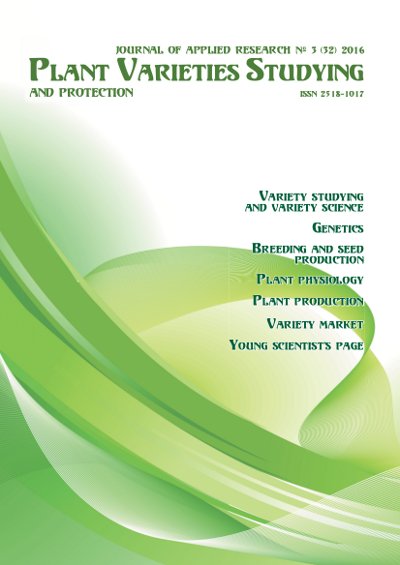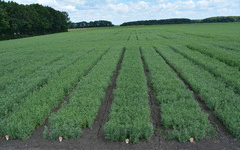Associations of alleles of microsatellite markers with agronomical traits of modern bread winter wheat varieties in Southern Ukraine
DOI:
https://doi.org/10.21498/2518-1017.3(32).2016.75973Keywords:
marker-trait associations, Triticum aestivum L., bread winter wheat varietiesAbstract
Purpose. Defining marker-trait associations of microsatellite markers with specific regions of the genome that control important agronomical traits in the investigated varieties originated in the Plant Breeding and Genetics Institute – National Center of Seed and Cultivar Investigations and entered into the State register of plant varieties suitable for dissemination in Ukraine during different years.
Methods. Molecular genetic methods (extraction of genomic DNA, polymerase chain reactions (PCR), electrophoresis of amplification products in polyacrylamide gel), field methods (phenological observations of heading date and analysis of plant height, visual assessment of the colour and length of wheat ear and awns), statistical methods (evaluation of trait means by descriptive statistic instruments of EXCEL package, ANOVA method performed by GLM instrument from AGROBASE 21 package).
Results. During four growing years (2010/11, 2011/12, 2012/13, 2013/14), 47 bread winter wheat varieties were phenotypically measured and analyzed with 17 microsatellite loci. 35 marker-trait associations (MTA) for heading date, 39 for plant height, 33 for awn size, 20 for ear colour and 8 for ear size were found to be stable and significant during two–four different growing years.
Conclusions. Microsatellite markers that showed substantial and stable during different growing years associations with agronomical traits can be useful and suitable for marker-assisted selection (MAS) in Ukrainian wheat breeding programs.
Downloads
References
Röder, M. S., Huang, X.-Q., & Börner, A. (2008). Fine mapping of the region on wheat chromosome 7D controlling grain weight. Funct Integr Genomics, 8(1), 79–86. doi: 10.1007/s10142-007-0053-8
Gupta, P. K., Rustgi, S., & Kumar, N. (2006). Genetic and molecular basis of grain size and grain number and its relevance to grain productivity in higher plants. Genome, 49(6), 565–571. doi: 10.1139/g06-063
Dilbirligi, M., Eraymana, M., Campbell, B. T., Randhawa, H. S., Baenziger, P. S., Dweikat, I., & Gill, K. S. (2006). High-density mapping and comparative analysis of agronomically important traits on wheat chromosome 3A. Genomics, 88(1), 74–87. doi: 10.1016/j.ygeno.2006.02.001
Litvinenko N. A. (1998). Breeding intensive winter bread wheat varieties for Southern Ukraine. Euphytica, 100(1–3), 7–14. doi: 10.1023/A:1018383317939
Brbaklic, L., Trkulja, D., Kondic-Spika, A., Treskic, S., & Kobiljski, B. (2013). Detection of QTLs for important agronomical traits in hexaploid wheat using association analysis. Czech J. Genet. Plant Breed, 49(1), 1–8.
Börner, A., Schumann, E., Fürste, A., Cöster, H., Leithold, B., Röder, M., & Weber, W. (2002). Mapping of quantitative trait loci determining agronomic important characters in hexaploid wheat (Triticum aestivum L.). Theor. Appl. Genet, 105(6–7), 921–936. doi: 10.1007/s00122-002-0994-1
Li, W. L., Nelson, J. C., Chu, C. Y., Shi, L. H., Huang, S. H., & Liu, D. J. (2002). Chromosomal locations and genetic relationships of tiller and spike characters in wheat. Euphytica, 125(3), 357–366. doi: 10.1023/A:1016069809977
Jantasuriyarat, C., Vales, M. I., Watson, C. J. W., & Riera-Lizarazu, O. (2004). Identification and mapping of genetic loci affecting the free-threshing habit and spike compactness in wheat (Triticum aestivum L.). Theor. Appl. Genet, 108(2), 261–273. doi: 10.1007/s00122-003-1432-8
Kirigwi, F. M., Ginkel, M. V., Brown-Guedira, G., Gill, B. S., Paulsen, G. M., & Fritz, A. K. (2007). Markers associated with a QTL for grain yield in wheat under drought. Mol. Breeding, 20(4), 401–413. doi: 10.1007/s11032-007-9100-3
Kumar, N., Kulwal, P. L., Balyan, H. S., & Gupta, P. K. (2007). QTL mapping for yield and yield contributing traits in two mapping populations of bread wheat. Mol. Breeding, 19(2), 163–177. doi: 10.1007/s11032-006-9056-8
Heidari, B., Sayed-Tabatabaei, B. E., Saeidi, G., & Suenaga, K. (2011). Mapping QTL for grain yield, yield components, and spike features in a doubled haploid population of bread wheat. Genome, 54(6), 517–527. doi: 10.1139/g11-017
Zanke, C., Ling, J., Plieske, J. Kollers, S., Ebmeyer, E., Korzun, V., & Röder, M. S. (2014). Genetic architecture of main effect QTL for heading date in European winter wheat (Triticum aestivum L.). PLoS ONE, 9(11), e113287. Retrieved from http://journals.plos.org/plosone/article?id=10.1371/journal.pone.0113287. doi: 10.1371/journal.pone.0113287
Metodyka provedennia ekspertyzy sortiv pshenytsi miakoi (Triticum aestivum L. emend. Fiori et Paol.) na vidminnist, odnoridnist i stabilnist [Regulations on the procedure and the conduct of tests for distinctness, uniformity and stability (DUS) of new bread wheat (Triticum aestivum L. emend. Fiori et Paol.) varieties for the purpose of granting the Breeders’ Right]. (n.d.). Retrieved from http://sops.gov.ua/uploads/files/documents/Metodiki/12.pdf. [in Ukrainian]
Lytvynenko, M. A. (2001). Teoretychni osnovy ta metody selektsii ozymoi miakoi pshenytsi na pidvyshchennia adaptyvnoho potentsialu dlia umov Stepu Ukrainy [Theoretical basis and methods of breeding bread winter wheat of universal type for increasing its adaptive ability under the conditions of the Steppe zone of Ukraine]. (Extended Abstract of Dr. Agric. Sci. Diss.). Institute of Agriculture, Kyiv, Ukraine. [in Ukrainian]
Kolesnik, O. O., Chebotar, S. V., Khokhlov, O. M., & Sivolap, Yu. M. (2009). Differentiating ability of wheat variety identification methods using microsatellite analysis and computer-based determination of the grain morphometric parameters. Visnyk Odeskoho natsionalnoho universytetu. Biolohiia [Odesa National University Herald. Biology], 14(14), 27–42. [in Ukrainian]
Kolesnyk, O. O., Chebotar, S. V., Khokhlov, O. M., & Sivolap, Yu. M. (2012). Differentiation of the modern soft winter wheat varieties from the south of Ukraine by allele composition of microsatellite loci. Zbirnyk naukovykh prats SHI–NTsNS [Collected scientific articles of PBGI–NCSCI], 19(59), 47–59. [in Ukrainian]
Syvolap, Yu. M., Volkodav, V. V., & Balvynska, M. S. (2004). Identyfikatsiia i reiestratsiia henotypiv miakoi pshenytsi (Triticum aestivum L.), yachmeniu (Hordeum vulgare L.), kukurudzy (Zea mays L.), soniashnyka (Helianthus annuus L.) za dopomohoiu analizu mikrosatelitnykh lokusiv [Identification and registration of genotypes of common wheat (Triticum aestivum L.), barley (Hordeum vulgare L.), maize (Zea mays L.) and sunflower (Helianthus annuus L.) by microsatellite locus analysis]. Odesa: TOV “Zovnishreklamservis”. [in Ukrainian]
Syvolap, Yu. M. (Ed.). (1998). Ispol’zovanie PTsR-analiza v genetiko-selektsionnykh issledovaniyakh [The Use of PCR-analysis in Genetic and Breeding Research]. Kyiv: Ahrarna nauka. [in Russian]
Röder, M. S., Korzun, V., Wendehake, K., Plaschke, J., Tixier, M. H., Leroy, P., & Ganal, M. W. (1998). A microsatellite map of wheat. Genetics, 149(4), 2007–2023. doi: 10.1016/B0-12-227620-5/00113-0
Rokitskiy, P. F. (1973). Biologicheskaya statistika [Biological Statistics]. Moscow: Kolos. [in Russian]
Stroup, W. W., Baenziger, P. S., & Mulitze, D. K. (1994). Removing spatial variation from wheat yield trials: a comparison of methods. Crop Science, 34(1), 62–66. doi: 10.2135/cropsci1994.0011183X003400010011x
Landjeva, S., Korzun, V., & Ganeva, G. (2006). Evaluation of genetic diversity among Bulgarian winter wheat (Triticum aestivum L.) varieties during the period 1925–2003 using microsatellites. Gen. Res. Crop Evol, 53(8), 1605–1614. doi: 10.1007/s10722-005-8718-4
Payne, P. I., Holt, L. M., Johnson, R., & J. W. Snape, (1986). Linkage mapping of four gene loci, Glu-B1, Gli-B1, Rg1 and Yr10 on chromosome 1B of bread wheat. Genetica Agraria, 40, 231–242.
Khlestkina, E. K. (2013). Genes determining the coloration of different organs in wheat. Russ. J. of Genetics: Appl Research, 3(1), 54–65. doi: 10.1134/S2079059713010085
Leonova, I., Pestsova, E., Salina, E. Efremova T., Röder, M. S., Börner, A., & Fischbeck, G. (2003). Mapping of the Vrn-B1 gene in Triticum aestivum L. using microsatellite markers. Plant Breeding, 122(3), 209–212. doi: 10.1046/j.1439-0523.2003.00818.x
Chaturvedi, B. K., & Gupta, R. R. (1995). Selection parameters for some grain and quality attributes in spring wheat (Triticum aestivum L.). Agric. Sci. Digest. Kernal, 15(4), 186–190.
Downloads
Published
How to Cite
Issue
Section
License
Copyright (c) 2016 Ukrainian Institute for Plant Variety Examination

This work is licensed under a Creative Commons Attribution-ShareAlike 4.0 International License.
Starting in 2022, the copyright to the publication remains with the authors
Our journal abides by the CREATIVE COMMONS copyright rights and permissions for open access journals.
Authors, who are published in this journal, agree to the following conditions:
- The authors reserve the right to authorship of the work and pass the first publication right of this work to the journal under the terms of a Creative Commons Attribution License, which allows others to freely distribute the published research with the obligatory reference to the authors of the original work and the first publication of the work in this journal.
- The authors have the right to conclude separate supplement agreements that relate to non-exclusive work distribution in the form in which it has been published by the journal (for example, to upload the work to the online storage of the journal or publish it as part of a monograph), provided that the reference to the first publication of the work in this journal is included.

























 Ukrainian Institute for Plant Varieties Examination
Ukrainian Institute for Plant Varieties Examination  Селекційно-генетичний інститут
Селекційно-генетичний інститут Institute of Plant Physiology and Genetics of the National Academy of Sciences of Ukraine
Institute of Plant Physiology and Genetics of the National Academy of Sciences of Ukraine
 The National Academy of Agrarian Sciences of Ukraine
The National Academy of Agrarian Sciences of Ukraine